Stages of Pregnancy: Week by Week
Overview

A typical pregnancy lasts 40 weeks from the first day of your last menstrual period (LMP) to the birth of the baby. It is divided into three stages, called trimesters: first trimester, second trimester, and third trimester. The fetus undergoes many changes throughout maturation.
How Soon Can You Tell If You Are Pregnant?

A missed period is often the first sign that you may be pregnant, but how do you know for sure? Many women use home pregnancy tests to tell if they are pregnant; however, these tests are more likely to be accurate when used at least one week after a woman's last period. If you take the test less than 7 days before your last menstrual period, it may give you a false result. If the test is positive, it is more likely that you actually are pregnant. However, if the test is negative, there is an increased chance that the test is wrong. Your doctor can do a blood test to detect pregnancy sooner than a home pregnancy test can.
Pregnancy Weight Gain

The amount of weight a woman should gain during pregnancy depends on her body mass index (BMI) prior to becoming pregnant. Women who are a normal weight should gain between 25 and 35 pounds. Women who are underweight prior to pregnancy should gain more. Women who are overweight or obese prior to pregnancy should gain less. The recommended caloric intake for a normal weight woman who exercises less than 30 minutes per week is 1,800 calories per day during the first trimester, 2,200 calories per day during the second trimester, and 2,400 calories during the third trimester.
Pregnancy Weight Gain Distribution

Women gain weight all over their bodies while they are pregnant. Fetal weight accounts for about 7 1/2 pounds by the end of pregnancy. The placenta, which nourishes the baby, weights about 1 1/2 pounds. The uterus weighs 2 pounds. A woman gains about 4 pounds due to increased blood volume and an additional 4 pounds due to increased fluid in the body. A woman's breasts gain 2 pounds during pregnancy. Amniotic fluid that surrounds the baby weighs 2 pounds. A woman gains about 7 pounds due to excess storage of protein, fat, and other nutrients. The combined weight from all these sources is about 30 pounds.
Pregnancy Complications

Pregnant women may experience certain complications and symptoms as the fetus grows. Anemia, urinary tract infection, and mood changes may occur. An expectant mother may experience high blood pressure (preeclampsia), which increases the risk of preterm delivery and other potential dangers for the baby. Severe morning sickness or hyperemesis gravidarum causes persistent nausea and vomiting, particularly during the first 12 pregnancy weeks. This may lead to first trimester symptoms of weight loss and dehydration, requiring IV fluids and antinausea medication. Pregnant women should be aware of the possibility of developing gestational diabetes. It causes symptoms like excessive thirst and hunger, frequent urination, and fatigue. Obesity and excessive weight gain are possible, especially as the pregnancy progresses. Women are supposed to gain weight during pregnancy, but excessive weight gain may be associated with symptoms that put mother and baby at risk. Ask your doctor how much weight you should gain during your pregnancy.
The Three Stages of Pregnancy
(1st, 2nd, and 3rd Trimester)

Conception to about the 12th week of pregnancy marks the first trimester. The second trimester is weeks 13 to 27, and the third trimester starts about 28 weeks and lasts until birth. This slide show will discuss what occurs to both the mother and baby during each trimester.
First Trimester

First Trimester: Week 1 (conception) – Week 12
First Trimester: Early Changes in a Woman's Body

The early changes that signify pregnancy become present in the first trimester. A missed period may be the first sign that fertilization and implantation have occurred, ovulation has ceased, and you are pregnant. Other changes will also occur.
First Trimester: Physical and Emotional Changes a Woman May Experience

Hormonal changes will affect almost every organ in the body. Some signs of early pregnancy in many women include symptoms like:
- Extreme fatigue
- Tender, swollen breasts. Nipples may protrude.
- Nausea with or without throwing up (morning sickness)
- Cravings or aversion to certain foods
- Mood swings
- Constipation
- Frequent urination
- Headache
- Heartburn
- Weight gain or loss
First Trimester: Changes in a Woman's Daily Routine

Some of the changes you experience in your first trimester may cause you to revise your daily routine. You may need to go to bed earlier or eat more frequent or smaller meals. Some women experience a lot of discomfort, and others may not feel any at all. Pregnant women experience pregnancy differently and even if they've been pregnant before. Pregnant women may feel completely differently with each subsequent pregnancy.
First Trimester: The Baby at 4 Weeks

At 4 weeks, your baby is developing:
- The nervous system (brain and spinal cord) has begun to form.
- The heart begins to form.
- Arm and leg buds begin to develop.
- Your baby is now an embryo and 1/25 of an inch long.
First Trimester: The Baby at 8 Weeks

At 8 weeks, the embryo begins to develop into a fetus. Fetal development is apparent:
- All major organs have begun to form.
- The baby's heart begins to beat.
- The arms and legs grow longer.
- Fingers and toes have begun to form.
- Sex organs begin to form.
- The face begins to develop features.
- The umbilical cord is clearly visible.
- At the end of 8 weeks, your baby is a fetus, and is nearly 1 inch long, weighing less than ⅛ of an ounce.
First Trimester: The Baby at 12 Weeks

The end of the first trimester is at about week 12, at this point in your baby's development:
- The nerves and muscles begin to work together. Your baby can make a fist.
- The external sex organs show if your baby is a boy or girl.
- Eyelids close to protect the developing eyes. They will not open again until week 28.
- Head growth has slowed, and your baby is about 3 inches long, and weighs almost an ounce.
Second Trimester
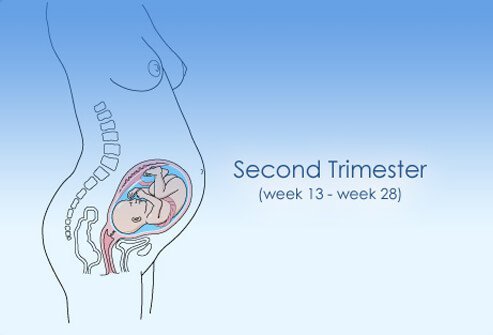
Second trimester: Week 13 – Week 28
Second Trimester: Changes a Woman May Experience
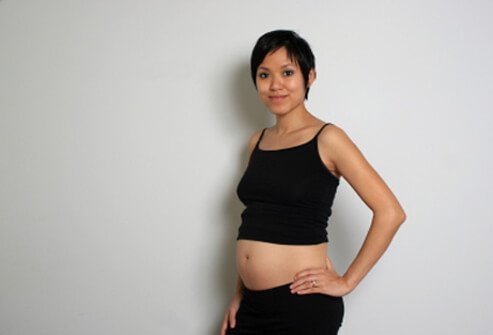
Once you enter the second trimester you may find it easier than the first. Your nausea (morning sickness) and fatigue may lessen or go away completely. However, you will also notice more changes to your body. That "baby bump" will start to show as your abdomen expands with the growing baby. By the end of the second trimester you will even be able to feel your baby move!
Second Trimester: Physical and Emotional Changes in a Woman

Some changes you may notice in your body in the second trimester include:
- Back, abdomen, groin, or thigh aches and pains
- Stretch marks on your abdomen, breasts, thighs, or buttocks
- Darkening of the skin around your nipples
- A line on the skin running from belly button to pubic hairline (linea nigra)
- Patches of darker skin, usually over the cheeks, forehead, nose, or upper lip. This is sometimes called the mask of pregnancy (melasma, or Chloasma facies).
- Numb or tingling hands (carpal tunnel syndrome)
- Itching on the abdomen, palms, and soles of the feet. (Call your doctor if you have nausea, loss of appetite, vomiting, yellowing of skin, or fatigue combined with itching. These can be signs of a liver problem.)
- Swelling of the ankles, fingers, and face. (If you notice any sudden or extreme swelling or if you gain a lot of weight quickly, call your doctor immediately. This could be a sign of a serious condition called preeclampsia.)
Second Trimester: The Baby at 16 Weeks
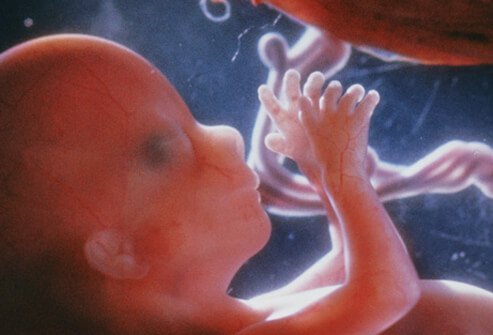
As your body changes in the second trimester, your baby continues to develop:
- The musculoskeletal system continues to form.
- Skin begins to form and is nearly translucent.
- Meconium develops in your baby's intestinal tract. This will be your baby's first bowel movement.
- Your baby begins sucking motions with the mouth (sucking reflex).
- Your baby is about 4 to 5 inches long and weighs almost 3 ounces.
Second Trimester: The Baby at 20 Weeks
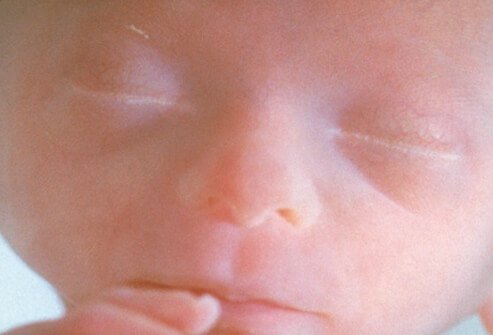
At about 20 weeks in the second trimester, your baby continues to develop:
- Your baby is more active. You might feel movement or kicking.
- Your baby is covered by fine, feathery hair called lanugo and a waxy protective coating called vernix.
- Eyebrows, eyelashes, fingernails, and toenails have formed. Your baby can even scratch itself.
- Your baby can hear and swallow.
- Now halfway through your pregnancy, your baby is about 6 inches long and weighs about 9 ounces.
Second Trimester: The Baby at 24 Weeks
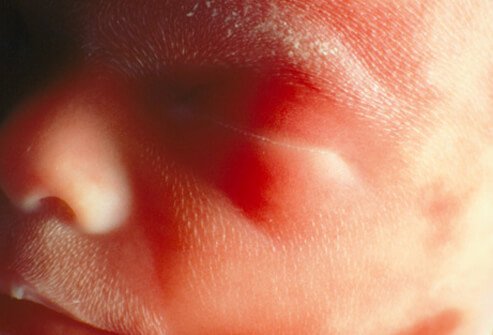
By 24 weeks, even more changes occur for your growing baby:
- The baby's bone marrow begins to make blood cells.
- Taste buds form on your baby's tongue.
- Footprints and fingerprints have formed.
- Hair begins to grow on your baby's head.
- The lungs are formed, but do not yet work.
- Your baby has a regular sleep cycle.
- If your baby is a boy, his testicles begin to descend into the scrotum. If your baby is a girl, her uterus and ovaries are in place, and a lifetime supply of eggs has formed in the ovaries.
- Your baby stores fat and weighs about 1½ pounds, and is 12 inches long.
Third Trimester
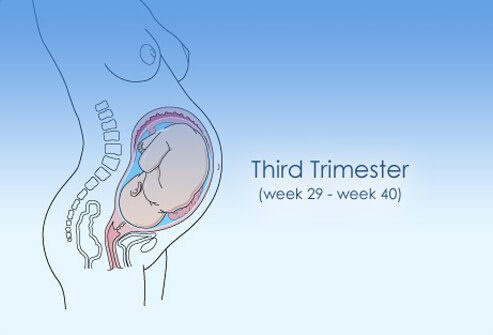
Third Trimester: Week 29 – Week 40 (birth)
Third Trimester: Changes a Woman May Experience
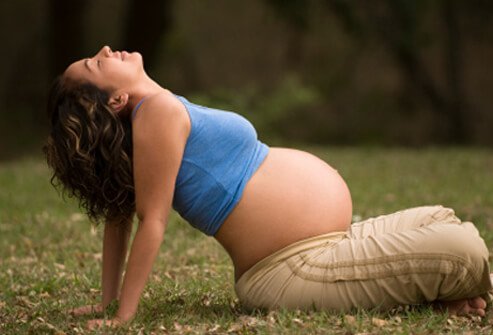
The third trimester is the final stage of pregnancy. Discomforts that started in the second trimester will likely continue, along with some new ones. As the baby grows and puts more pressure on your internal organs, you may find you have difficulty breathing and have to urinate more frequently. This is normal and once you give birth these problems should go away.
Third Trimester: Emotional and Physical Changes a Woman May Experience
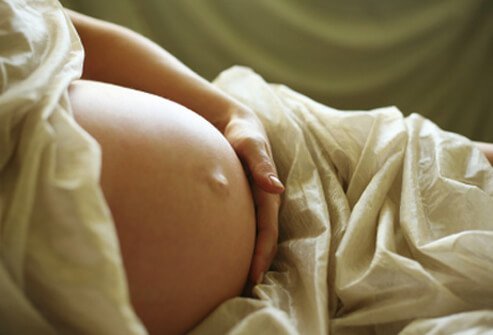
In the third and final trimester you will notice more physical changes, including:
- Swelling of the ankles, fingers, and face. (If you notice any sudden or extreme swelling or if you gain a lot of weight really quickly, call your doctor right away. This could be a sign of a serious condition called preeclampsia.)
- Hemorrhoids
- Tender breasts, which may leak a watery pre-milk called colostrum
- Your belly button may protrude
- The baby "dropping," or moving lower in your abdomen
- Contractions, which can be a sign of real or false labor
- Other symptoms you may notice in the third trimester include shortness of breath, heartburn, and difficulty sleeping
Third Trimester: Changes as the Due Date Approaches
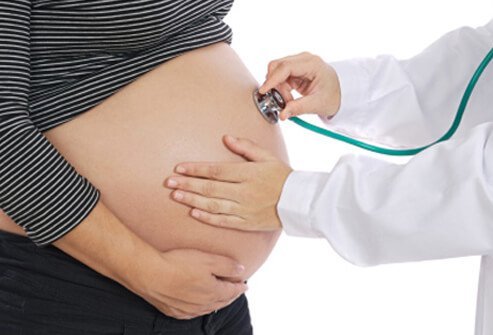
Other changes are happening in your body during the third trimester that you can't see. As your due date approaches, your cervix becomes thinner and softer in a process called effacement that helps the cervix open during childbirth. Your doctor will monitor the progress of your pregnancy with regular exams, especially as you near your due date.
Third Trimester: The Baby at 32 Weeks

At 32 weeks in the third trimester, your baby's development continues:
- Your baby's bones are soft but fully formed.
- Movements and kicking increase.
- The eyes can open and close.
- Lungs are not fully formed, but practice "breathing" movements occur.
- Your baby's body begins to store vital minerals, such as iron and calcium.
- Lanugo (fine hair) begins to fall off.
- Your baby is gaining about ½ pound a week, weighs about 4 to 4½ pounds, and is about 15 to 17 inches long.
Third Trimester: The Baby at 36 Weeks
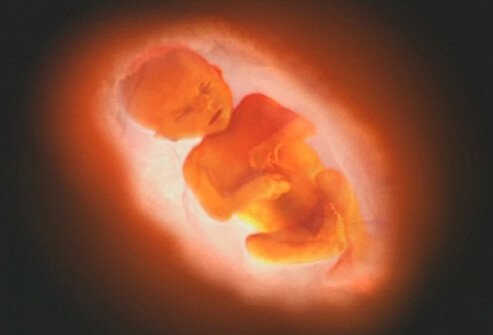
At 36 weeks, as your due date approaches, your baby continues development:
- The protective waxy coating (vernix) thickens.
- Body fat increases.
- Your baby is getting bigger and has less space to move around. Movements are less forceful, but you will still feel them.
- Your baby is about 16 to 19 inches long and weighs about 6 to 6½ pounds.
Third Trimester: The baby at 37 to 40 Weeks
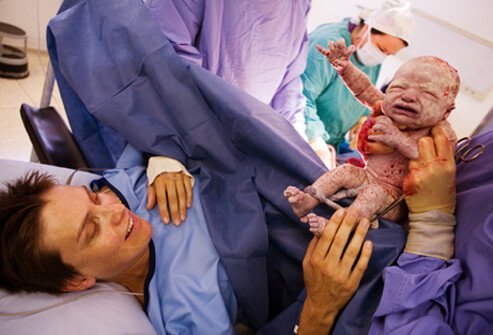
Finally, from 37 to 40 weeks the last stages of your baby's development occur:
- By the end of 37 weeks, your baby is considered full term.
- Your baby's organs are capable of functioning on their own.
- As you near your due date, your baby may turn into a head-down position for birth.
- Average birth weight is between 6 pounds 2 ounces to 9 pounds 2 ounces and average length is 19 to 21 inches long. Most full-term babies fall within these ranges, but healthy babies come in many different weights and sizes.
Stages of Pregnancy: Week by Week
IMAGES PROVIDED BY:
- Nestle / Petit Format / Photo Researchers, Inc.
- iStock
- iStock
- iStock
- iStock
- Womenshealth.gov
- Womenshealth.gov
- iStockPhoto / Scott Vickers
- iStockPhoto / Christine Glade
iStockPhoto / bobbieo
iStockPhoto / Marilyn Nieves
iStockPhoto / Robert Simon - BigStockPhoto / Merrill Dyck
- Copyright &Copy; Medical RF / Phototake -- All rights reserved.
- Copyright &Copy; Scott Camazine / Phototake -- All rights reserved.
- Copyright &Copy; LookatSciences / Phototake -- All rights reserved.
- Womenshealth.gov
- iStockPhoto / Julia Nuttall
- BigStockPhoto / Marta Wariatka
iStockPhoto / Don Bayley
"Color Atlas of Cosmetic Dermatology"; Marc R. Avram, Sandy Tsao, Zeina Tannous, Mathew M. Avram; Copyright 2007 by The McGraw-Hill Companies, Inc. All rights reserved. - Nestle / Petit Format / Photo Researchers, Inc.
- Petit Format / Photo Researchers, Inc.
- Neil Bromhall / Genesis Films / Photo Researchers, Inc.
- Womenshealth.gov
- iStockPhoto / Aldo Murillo
- iStockPhoto / Tatiana Morozova
- iStockPhoto / Jose Manuel Gelpi
- Petit Format / Photo Researchers, Inc.
- Copyright &Copy; LookatSciences / Phototake -- All rights reserved.
- iStockPhoto / Don Bayley
REFERENCES:
- Centers for Disease Control and Prevention (CDC): "Pregnancy."
- Womenshealth.gov: Centers for Disease Control and Prevention (CDC): "Stages of Pregnancy."
© 1996-2022 WebMD, LLC. All rights reserved.
Source slideshow on OnHealth
